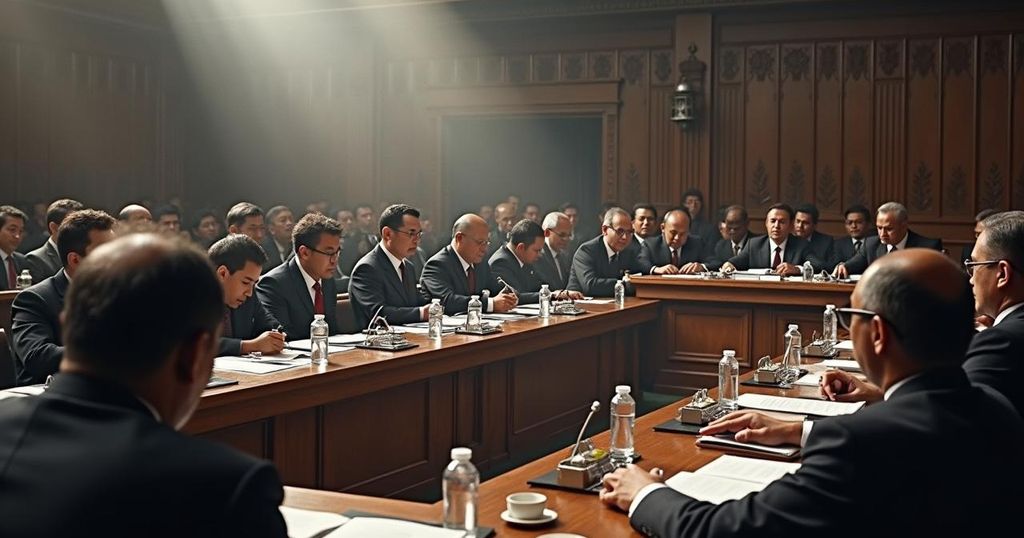The International People’s Tribunal has declared Indonesia responsible for crimes against humanity pertaining to the mass killings from 1965-1966, estimating fatalities between 500,000 and one million. The Tribunal identified ten significant human rights violations, including genocide against the Indonesian Communist Party’s members and supporters. Judge Zak Yacoob called for accountability, recommending the Indonesian government apologize to victims, pursue investigations into the atrocities, and protect survivor rights.
The International People’s Tribunal, convened in The Hague, has officially determined that the government of Indonesia is culpable for crimes against humanity stemming from the mass killings between 1965 and 1966. Estimates suggest that these atrocities resulted in the deaths of between 500,000 and one million individuals accused of being communists, primarily targeting members and sympathizers of the Indonesian Communist Party (PKI) during a military-backed purge that facilitated the ascension of former President Suharto’s regime. In their final judgment, a coalition of international judges concluded that the Indonesian state bears responsibility for ten significant human rights violations, including genocide aimed particularly at PKI members, their supporters, and those associated with the former President Soekarno, as well as members of the Indonesian National Party (PNI). Presiding Judge Zak Yacoob proclaimed, “The State of Indonesia is responsible for and guilty of crimes against humanity consequent upon the commission and perpetration, particularly by the military of that state through its chain of command, of the inhumane acts.” The tribunal identified a spectrum of gross human rights violations: mass killings, imprisonment, torture, forced disappearances, and other inhumane acts were acknowledged as part of a systematic assault against PKI affiliates and their families. Judge Yacoob emphasized the Indonesian state’s obligation to prevent such acts and punish those responsible, even extending to local vigilante actions that occurred independently of state authority. Furthermore, the Tribunal advocated for the Indonesian government to issue apologies to all victims, survivors, and their families for the crimes committed during this dark chapter of history. The Tribunal’s recommendations call for comprehensive investigations into the perpetrators, provide reparations for victims, and reinforce the protection of rights stipulated by both Indonesian and international law. The Tribunal has urged prompt governmental action to address the violations outlined in a report from the National Commission of Human Rights issued in 2012, advocating for the rehabilitation of survivors and the cessation of ongoing persecution against them.
The declaration made by the International People’s Tribunal highlights a long-overdue recognition of the catastrophic events surrounding the anti-communist purge in Indonesia during 1965-1966. This horrific period, marked by mass violence accompanied by deep political upheaval, not only reshaped the socio-political landscape of Indonesia but also left an indelible mark on human rights discourse globally. It is crucial to understand that this Tribunal convened as an independent body to assess the historical and legal implications of these atrocities as mainstream accountability mechanisms within Indonesia have largely remained ineffective, suppressing comprehensive discussions about historical injustices. The tribunal’s findings are significant, as they reflect widespread international condemnation of the events that transpired during that time—an era that still engenders anxiety and unresolved grievances among affected families and communities. While the Indonesian government has historically downplayed these events, the Tribunal’s ruling serves as a pivotal moment for acknowledging and addressing past injustices.
The findings of the International People’s Tribunal represent a landmark acknowledgment of Indonesia’s role in the mass killings of 1965-1966 and underscore the necessity for accountability and redress for victims. The Tribunal’s verdict not only calls for the Indonesian government to apologize and pursue justice for those affected but affirms the demanding obligations of states to uphold human rights. It is imperative that these recommendations are taken seriously to ensure that the grievous human rights violations of the past are recognized and addressed, fostering a spirit of reconciliation and safeguarding against future atrocities.
Original Source: jakartaglobe.id






